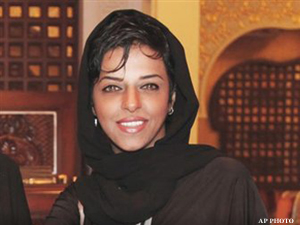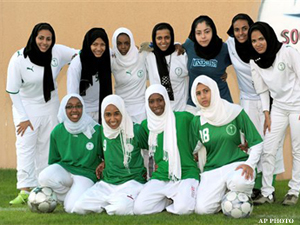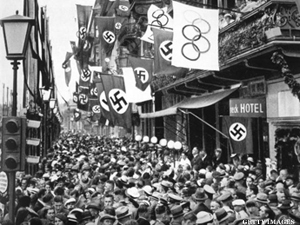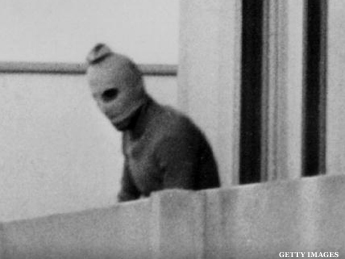
When Reema Abdullah carries the Olympic torch to the 2012 London Games, she'll be the first Saudi Arabian woman to do it. But the honor could be bittersweet if no female athletes from her country are allowed to compete in the games.
"It's a confusing picture, but in Reema Abdullah we already have a Saudi woman who is unhesitating and proud to be an athletic role model for Saudi women," writes Eman Al Nafjan in the Guardian.
Abdullah would be a role model for women anywhere, but the fact that she is the first female sports radio host in Saudi Arabia and the captain of the first public Saudi women's soccer team elevates her to a hero in a country where women face a daily struggle for autonomy. As the ultimate stage for international diplomacy, the Olympics are seen as a place where nations are supposed to set aside their cultural differences, stripping away race, religion and economic prosperity, leaving only athletic talent as the great decider.
Unfortunately, it's always a little more complicated. While Abdullah's participation signals progress, the fact that Saudi Arabia has kept the media, human rights organizations and the International Olympic Committee on their toes with their inconsistent position on sending female athletes the London Games certainly paints that "confusing picture."

Female participation in sports is still frowned upon in Saudi Arabia.
"Their reasoning is that it's masculine, that exercise would somehow result in girls losing their virginity and that it's against the physiological nature of being a woman," Al Nafjan writes.
The IOC is still hoping to convince the Saudis to send the three qualifying women, but the "confusing picture" extends far beyond Saudi Arabia and deeper into Olympic history. The IOC has set a precedent of banning countries from the Olympics if they are seen as violating the Olympic charter, which states, "Any form of discrimination with regard to a country or a person on grounds of race, religion, politics, gender or otherwise is incompatible with belonging to the Olympic Movement."
From the 1964 ban on South Africa for refusing to renounce apartheid to the 1999 ban on Afghanistan for not only refusing to send women, but for the Taliban's refusal to allow Afghan women to play sports at all. It leaves many wondering, why not ban Saudi Arabia from the London Games?

"I think the IOC lacks the cojones to do it," says Bill Mallon, past president and co-founder of the International Society of Olympic Historians. Mallon says if the IOC banned South Africa and Afghanistan for violating the charter, they should do the same to Saudi Arabia. The non-profit Human Rights Watch agrees.
"The time is running out for hope that dialogue with Saudi authorities will lead to a change in discriminatory policies," Christophe Wilcke, senior Middle East researcher with HRW, said in a statement. "It is clear that a symbolic participation in the London 2012 games by Saudi women athletes does not mean an end to the systematic discrimination against women practicing sports in Saudi Arabia and in international competitions."
The Saudi Arabian controversy, and those that came before, invites the question of whether the IOC is supposed to act as a global moral compass.
"The Olympic Games are the largest peacetime gathering of humanity in the history of the world," says Mallon, quoting the late Jim McKay.

It's true. Sports have a way of helping people forget their differences, and the Olympics aim provide the ultimate melting pot. One sprinter trains in the American suburbs, another in an African village. But on the track, it comes down to speed.
"When you play sports at a high level," says Mallon, a former professional golfer, "you meet so many people from different backgrounds and races, and you realize you're more alike than different."
But of course, Olympic history is not entirely one of peace. The 1936 Olympics in Berlin became a stage for Nazi propaganda. Palestinians massacred 11 Israeli athletes and coaches and a West German police officer during the 1972 Summer Olympics in Munich. Still, it wouldn't be fair to blame it on the IOC. As Mallon explains, countries need a lot of time to plan the logistics of hosting the Olympics. That's why host cities are now awarded seven years in advance. It used to be five years, and Berlin was awarded the 1936 Games in 1931.
"You can't just cancel them and move them, although that's what people wanted," Mallon says of the Berlin Games. "It was may not have been the best decision to hold them in Berlin, but I think it was harder for the committee to know what to do with that."

Many have argued holding the 2008 Summer Olympics in Beijing was a mistake. The IOC's decision to host the Games in China incited numerous complaints. From China's support of oppressive regimes like Sudan and North Korea and China's religious persecution against Tibetan monks to air pollution and a state-controlled media, the list went on. But Mallon says it may take 10 to 20 years to truly know the ultimate judgment.
There's no empirical data to prove the Olympics are a catalyst for progress. But when a nation like Afghanistan faces an Olympic ban and five years later, sends two women to the 2004 Athens Games, it's promising.
At the very least, the Olympics are a catalyst for global conversation. At the end of this month, at their executive meeting in Quebec, the IOC will take up the issue of Saudi discrimination against women. It may take 10 or 20 years, but one day we might now if the brewing Olympic controversy helps to change Saudi attitudes toward women in sports. For now, the world will be watching Reema Abdullah carry the torch.
Popular Stories On ThePostGame:
-- The Rise Of American Football In The Holy Land
-- Why High Heels Make Your Breasts Sag
-- Cubs Fans Walking 1,900 Miles With Goat To Fight Cancer, End Curse
-- Memory Of Charlie Batch's Slain Sister Lives Through His Youth Foundation




